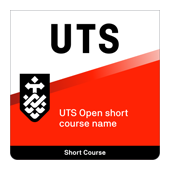Key benefits of this course
By the conclusion of this course, you should have:
- Learned from specialist leadership practitioners and thinkers who understand the realities of leading in local government
- Developed awareness of individual leadership capability within the context of sector recognised capability frameworks
- An understanding of leadership approaches that help develop impact for council and communities
- Built confidence in applying tools and approaches back into the workplace
- Increased your professional capability to lead for impact
- Broadened understanding of different leadership styles and environments for impact.
Digital badge and certificate

A digital badge and certificate will be awarded following the successful completion of any necessary tasks or assessments to demonstrate acquired learning of the short course or for meeting attendance and/or participation requirements.
Learn more about UTS Open digital badges.
Course outline
The following topics will be covered during this leadership course:
Part 1
- The context for Leading with Impact in local government
- Exploring the 3 C’s of leadership frameworks: Capacity – Capability – Competency.
Part 2
- ‘Impact’: leadership and management perspectives
- ‘Impact’: leadership influences and your authentic style
- Leadership tools for impact: ethical, adaptive, collaborative approaches.
Part 3
- Leading for Impact: your next steps.
Price
Full price: $798 (GST free)*
*Price subject to change. Please check price at time of purchase.
Discounts are available for this course. For further details and to verify if you qualify, please check the Discounts section.
Discounts
Discounts are available for this course as follows:
- 10% discount for UTS staff, alumni and students
Discounts cannot be combined and only one discount can be applied per person per course session. Discounts can only be applied to the full price. Discounts cannot be applied to any offered special price.
How to enrol and obtain your UTS staff, alumni or student discount
Please contact the team at support@open.uts.edu.au with either your staff or student number.
If you are eligible for a UTS alumni or student discount, please ensure you have provided your UTS student number during checkout.
If you are an alumni and have forgotten your UTS student number, email support@open.uts.edu.au with your full name, UTS degree and year of commencement.
Delivery style
The leadership course uses a blend of presentation, discussion, case in point teaching, consultation in pairs, group exercises and individual take-away tasks to put into practice learnings in the workplace. This training approach allows you to work through concepts introduced by the presenter in an application-focused teaching environment. You will challenge your understanding of the concepts and consider their application once back in your individual workplace.
Leadership course series
This leadership course has no prerequisites and is open to all members of the public. The course is one of five leadership courses in our Leading in Local Government series. Select the combination of courses from the list below that will meet your learning needs.
Enrolment conditions
Course purchase is subject to UTS Open Terms and Conditions.
Contact us
If you have a specific question on course content or requirements, please email ippg.learning@uts.edu.au



















